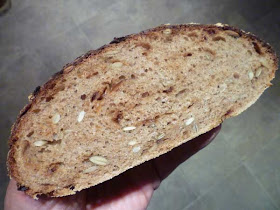Whole Wheat Integrale with Carmelized Onion
I work as a nurse on the palliative care unit of a nearby tertiary care hospital. At the end of shift a short while ago a patient asked me what I would be doing on my day off.
I told her that I was going home to bake some bread. "I've been baking my own sourdough bread for some time now," I told her with a shrug.
She smiled and nodded gravely, as if it all made perfect sense now.
"Ah," she said. "the staff of life."
This woman is no longer with us. But I remain haunted by what she said.
Perhaps it really is this simple: why I am so obsessed with baking bread. All day long I work with death, I hold the hands of the dying, my arms are around those who are grieving. When I come home, I breathe deeply, and let it all slip away: thoughts of mortality, fleeting time, the empty question-mark of death, and the endless chasm of loneliness left in the wake of love forever more unrequited -- I surrender it all.
I plunge my hands into the mystery of basic ingredients: grains, water, salt: the lower number elements of the periodic table. Something here is alive, something here is transformed anew, something here is resurrected. I awaken again to the mystery of life.
Caramelized Onions
One of my coworkers made some wraps with caramelized onions for a Thanksgiving potluck the other day, and it gave me the idea to try them in a bread. The Tartine Bread book talks a little bit about caramelizing onions for a brioche hamburger bun dough. I just wanted to add them to my everyday Tartine Integrale bread. I had a couple of medium-large onions, but one of them had a significant bad spot, so I ended up with a mere 1 1/2 onions, diced.
They were caramelized over med-low heat in olive oil for about an hour or more, and then I cooled them between some paper-towels for 30 minutes before adding them to the 80% hdrated Tartine 100% whole wheat integrale dough. I also added a quarter cup each of pumpkin and sunflower seeds. It was turned q30min for 4 hours, then I plunked it in a basket to proof for a couple of hours.
This was the first time I've used my new Baking stone. It's been a long time since I used a stone, and I had the oven too hot. I had preheated to 500 degrees F and forgot to turn it down for the actual baking. And the one loaf that I did remember to turn it to 450 degrees F, was still a bit overdone at 40 minutes.
Results
So my crust is a little burnt. And the loaves are a bit misshapen.
C'est le vie.
Actually, even the darkest bread tastes quite all right. Maybe it is the onions, or the oil they were caramelized in, combining with the dough: perhaps thereby the Maillard reaction is intensified. The roasted nature of the onions and grains imparts more flavour and scent. Not a bad bread, for all that. I will eat the darker loaf, and give the other one to my friends.
Take it and eat: the staff of life.
Notes to Myself
- Try a temperature of 425 degrees F for the same amount of time and see if the loaf improves. Alternatively, you could pull the bread out of the oven after 35 minutes.
- More steam might be required. I have been using a hot pan with a glass full of water at the moment the bread is introduced to the oven, but perhaps spritzing water would be a good idea for the first 10-12 minutes too, to keep things very moist. Others use water-soaked towels in the pan, and I might try that once too (if my wife doesn't mind me destroying yet another towel)
- Longer proofing for more airy crust. This is quite all right the way it is, though.
















have yet to get my copy of the Tartine cook book, your bread sounds absolutely delicious! Thanks for all the notes!
ReplyDeleteI predict you won't regret getting that book. It truly simplifies the sourdough process, and it makes great bread. I rarely look at it anymore, even though I haven't made many recipes from it (since it doesn't stick to whole grains which are my passion), but I credit that book with the best bread I've made consistently.
ReplyDelete